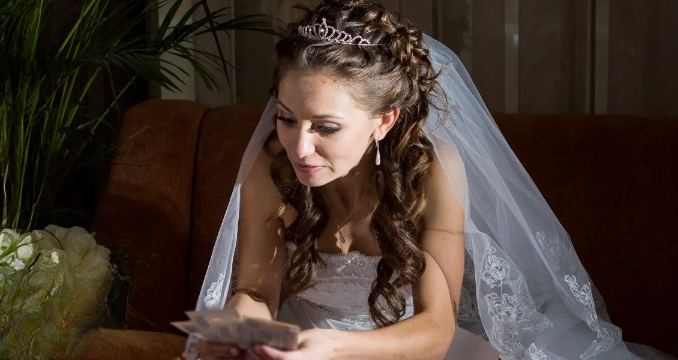
Nina never expected her cousin Clara’s wedding to be normal—Clara had always been the extravagant type. But what began as a typical ceremony spiraled into something much darker when Clara dropped an outrageous demand: $500 in cash from select guests, including Nina. What followed was a brutal awakening, a public takedown from the bride’s own mother, and a lesson Nina won’t soon forget.
Clara had always treated life like a competition—whether it was brunch reservations or birthday gifts, she wanted to win. But nothing prepared Nina for the text that arrived just seven days before the wedding.
“Hey Nina! Just a reminder—everyone’s expected to bring $500 cash to the wedding. No exceptions! It’s for the house fund. Thanks! ❤️ —Clara”
Nina blinked. $500? As if the flights, hotel, and outfit hadn’t already cost a fortune. And that “reminder”? There had been no mention of this fee in the invitations, group chats, or any previous communication.
What stung more was the fact that Nina had already picked out a thoughtful, personalized gift: a custom art piece featuring Clara and Mason’s names, wedding date, and birthstones. It was meaningful. Handmade. Something to be cherished.
But apparently, Clara preferred cash.
Trying to stay calm, Nina responded with honesty. She explained she couldn’t afford an extra $500 on top of everything else and had already prepared a gift she was excited to give.
Clara replied instantly:
“Umm… not really okay. Everyone’s giving the same. It’s not fair if some people get to be cheap.”
Cheap. That was the word that made Nina’s blood run cold.
Confused and hurt, she reached out to mutual friends. None of them had received any similar request. That’s when it became clear—Clara had cherry-picked who to charge, targeting guests she thought had money to spare.
Nina, fresh off a promotion, had made Clara’s “premium” list. Not out of closeness or love—but for her perceived bank account.
Still, Nina decided to attend. Not for Clara—but for clarity.
The vineyard venue was straight out of a magazine—fairy lights, flower arrangements, and picture-perfect views. At the welcome table, a hostess asked her for “the envelope.”
“What envelope?” Nina asked, holding her wrapped gift.
The hostess stiffened. “Cash envelope. You’re on the premium guest list.”
Nina’s heart dropped.
But before she could react, a voice cut through the air.
“Nina, honey! What’s going on out here?”
Aunt Elise—Clara’s mother—stepped forward. Nina handed her the clipboard.
“Did you know your daughter is charging some of us to enter her wedding?”
Aunt Elise read the list. Her expression hardened instantly. Without a word, she marched into the venue and took the microphone.
“I’d like to toast my daughter before the ceremony begins,” she said, voice calm but sharp.
“To Clara—who’s decided that love isn’t enough unless it comes with $500 in cash.”
The crowd gasped.
“Did you know she created a premium guest list?” Elise continued. “Asking certain guests to pay for the honor of attending—based not on kindness, but assumption.”
Whispers rippled. Guests glanced at one another, shocked.
Elise held the clipboard high—then tore it in two.
“If you value money more than people,” she said, “you’ll end up with neither.”
Guests began leaving. Some reclaimed gifts. Others walked out in silence. Clara stood frozen, bouquet trembling in her hands, lips parted in disbelief.
The ceremony limped forward, but the magic was gone. Nina slipped out early, chocolate tart in hand, not looking back until the last moment—just enough to see Clara, alone beneath the archway, bouquet wilting.
Days later, Clara sent an email—not an apology, but a scolding.
“You could’ve come to me, Nina. You humiliated me. I thought family came first.”
But Nina had supported her. She flew in, brought a gift, stayed silent longer than she should have.
What Clara wanted wasn’t love—it was control.
Nina didn’t reply.
Months passed. Edited wedding photos appeared online. Smiles polished, tension erased. But the dream house never happened. Clara and Mason moved to a modest apartment elsewhere.
Sometimes, Nina thinks about that art piece—still wrapped in brown paper, hidden in her closet. A symbol of effort wasted on someone who wanted profit, not presence.
Because weddings can be planned to perfection—but you can’t charge people for love.
And you certainly can’t buy respect with a clipboard.
Leave a Reply